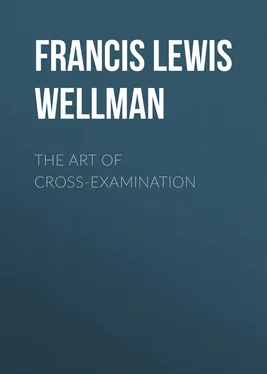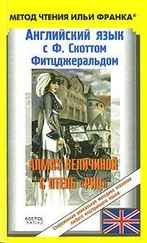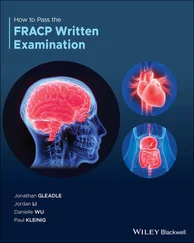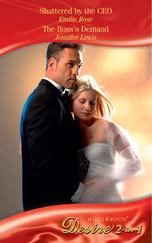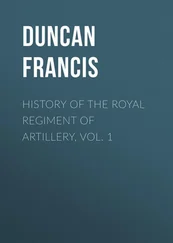Francis Lewis Wellman - The Art of Cross-Examination
Здесь есть возможность читать онлайн «Francis Lewis Wellman - The Art of Cross-Examination» — ознакомительный отрывок электронной книги совершенно бесплатно, а после прочтения отрывка купить полную версию. В некоторых случаях можно слушать аудио, скачать через торрент в формате fb2 и присутствует краткое содержание. Жанр: foreign_edu, Юриспруденция, на английском языке. Описание произведения, (предисловие) а так же отзывы посетителей доступны на портале библиотеки ЛибКат.
- Название:The Art of Cross-Examination
- Автор:
- Жанр:
- Год:неизвестен
- ISBN:нет данных
- Рейтинг книги:3 / 5. Голосов: 1
-
Избранное:Добавить в избранное
- Отзывы:
-
Ваша оценка:
- 60
- 1
- 2
- 3
- 4
- 5
The Art of Cross-Examination: краткое содержание, описание и аннотация
Предлагаем к чтению аннотацию, описание, краткое содержание или предисловие (зависит от того, что написал сам автор книги «The Art of Cross-Examination»). Если вы не нашли необходимую информацию о книге — напишите в комментариях, мы постараемся отыскать её.
The Art of Cross-Examination — читать онлайн ознакомительный отрывок
Ниже представлен текст книги, разбитый по страницам. Система сохранения места последней прочитанной страницы, позволяет с удобством читать онлайн бесплатно книгу «The Art of Cross-Examination», без необходимости каждый раз заново искать на чём Вы остановились. Поставьте закладку, и сможете в любой момент перейти на страницу, на которой закончили чтение.
Интервал:
Закладка:
All through the direct testimony of our imaginary witness, it will be remembered, we were watching his every movement and expression. Did we find an opening for our cross-examination? Did we detect the weak spot in his narrative? If so, let us waste no time, but go direct to the point. It may be that the witness's situation in respect to the parties or the subject-matter of the suit should be disclosed to the jury, as one reason why his testimony has been shaded somewhat in favor of the side on which he testifies. It may be that he has a direct interest in the result of the litigation, or is to receive some indirect benefit therefrom. Or he may have some other tangible motive which he can gently be made to disclose. Perhaps the witness is only suffering from that partisanship, so fatal to fair evidence, of which oftentimes the witness himself is not conscious. It may even be that, if the jury only knew the scanty means the witness has had for obtaining a correct and certain knowledge of the very facts to which he has sworn so glibly, aided by the adroit questioning of the opposing counsel, this in itself would go far toward weakening the effect of his testimony. It may appear, on the other hand, that the witness had the best possible opportunity to observe the facts he speaks of, but had not the intelligence to observe these facts correctly. Two people may witness the same occurrence and yet take away with them an entirely different impression of it; but each, when called to the witness stand, may be willing to swear to that impression as a fact. Obviously, both accounts of the same transaction cannot be true; whose impressions were wrong? Which had the better opportunity to see? Which had the keener power of perception? All this we may very properly term the matter of our cross-examination.
It is one thing to have the opportunity of observation, or even the intelligence to observe correctly, but it is still another to be able to retain accurately, for any length of time, what we have once seen or heard, and what is perhaps more difficult still—to be able to describe it intelligibly. Many witnesses have seen one part of a transaction and heard about another part, and later on become confused in their own minds, or perhaps only in their modes of expression, as to what they have seen themselves and what they have heard from others. All witnesses are prone to exaggerate—to enlarge or minimize the facts to which they take oath.
A very common type of witness, met with almost daily, is the man who, having witnessed some event years ago, suddenly finds that he is to be called as a court witness. He immediately attempts to recall his original impressions; and gradually, as he talks with the attorney who is to examine him, he amplifies his story with new details which he leads himself, or is led, to believe are recollections and which he finally swears to as facts. Many people seem to fear that an "I don't know" answer will be attributed to ignorance on their part. Although perfectly honest in intention, they are apt, in consequence, to complete their story by recourse to their imagination. And few witnesses fail, at least in some part of their story, to entangle facts with their own beliefs and inferences.
All these considerations should readily suggest a line of questions, varying with each witness examined, that will, if closely followed, be likely to separate appearance from reality and to reduce exaggerations to their proper proportions. It must further be borne in mind that the jury should not merely see the mistake; they should be made to appreciate at the time why and whence it arose. It is fresher then and makes a more lasting effect than if left until the summing up, and then drawn to the attention of the jury.
The experienced examiner can usually tell, after a few simple questions, what line to pursue. Picture the scene in your own mind; closely inquire into the sources of the witness's information, and draw your own conclusions as to how his mistake arose, and why he formed his erroneous impressions. Exhibit plainly your belief in his integrity and your desire to be fair with him, and try to beguile him into being candid with you. Then when the particular foible which has affected his testimony has once been discovered, he can easily be led to expose it to the jury. His mistakes should be drawn out often by inference rather than by direct question, because all witnesses have a dread of self-contradiction. If he sees the connection between your inquiries and his own story, he will draw upon his imagination for explanations, before you get the chance to point out to him the inconsistency between his later statement and his original one. It is often wise to break the effect of a witness's story by putting questions to him that will acquaint the jury at once with the fact that there is another more probable story to be told later on, to disclose to them something of the defence, as it were. Avoid the mistake, so common among the inexperienced, of making much of trifling discrepancies. It has been aptly said that "juries have no respect for small triumphs over a witness's self-possession or memory." Allow the loquacious witness to talk on; he will be sure to involve himself in difficulties from which he can never extricate himself. Some witnesses prove altogether too much; encourage them and lead them by degrees into exaggerations that will conflict with the common sense of the jury. Under no circumstances put a false construction on the words of a witness; there are few faults in an advocate more fatal with a jury.
If, perchance, you obtain a really favorable answer, leave it and pass quietly to some other inquiry. The inexperienced examiner in all probability will repeat the question with the idea of impressing the admission upon his hearers, instead of reserving it for the summing up, and will attribute it to bad luck that his witness corrects his answer or modifies it in some way, so that the point is lost. He is indeed a poor judge of human nature who supposes that if he exults over his success during the cross-examination, he will not quickly put the witness on his guard to avoid all future favorable disclosures.
David Graham, a prudent and successful cross-examiner, once said, perhaps more in jest than anything else, "A lawyer should never ask a witness on cross-examination a question unless in the first place he knew what the answer would be, or in the second place he didn't care." This is something on the principle of the lawyer who claimed that the result of most trials depended upon which side perpetrated the greatest blunders in cross-examination. Certainly no lawyer should ask a critical question unless he is sure of the answer.
Mr. Sergeant Ballantine, in his "Experiences," quotes an instance in the trial of a prisoner on the charge of homicide, where a once famous English barrister had been induced by the urgency of an attorney, although against his own judgment, to ask a question on cross-examination, the answer to which convicted his client. Upon receiving the answer, he turned to the attorney who had advised him to ask it, and said, emphasizing every word, "Go home; cut your throat; and when you meet your client in hell, beg his pardon."
It is well, sometimes, in a case where you believe that the witness is reluctant to develop the whole truth, so to put questions that the answers you know will be elicited may come by way of a surprise and in the light of improbability to the jury. I remember a recent incident, illustrative of this point, which occurred in a suit brought to recover the insurance on a large warehouse full of goods that had been burnt to the ground. The insurance companies had been unable to find any stock-book which would show the amount of goods in stock at the time of the fire. One of the witnesses to the fire happened to be the plaintiff's bookkeeper, who on the direct examination testified to all the details of the fire, but nothing about the books. The cross-examination was confined to these few pointed questions.
Читать дальшеИнтервал:
Закладка:
Похожие книги на «The Art of Cross-Examination»
Представляем Вашему вниманию похожие книги на «The Art of Cross-Examination» списком для выбора. Мы отобрали схожую по названию и смыслу литературу в надежде предоставить читателям больше вариантов отыскать новые, интересные, ещё непрочитанные произведения.
Обсуждение, отзывы о книге «The Art of Cross-Examination» и просто собственные мнения читателей. Оставьте ваши комментарии, напишите, что Вы думаете о произведении, его смысле или главных героях. Укажите что конкретно понравилось, а что нет, и почему Вы так считаете.
